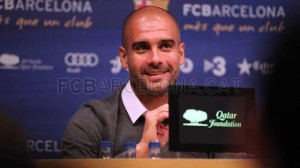
When Pep Guardiola appeared before the press on April 27 to announce his departure as FC Barcelona’s head coach at the end of the season, he said he felt exhausted and “empty.” Four years leading the club had brought a record-breaking haul of trophies and made him perhaps the most respected coach in world football. But, as Guardiola admitted, “Four years at Barcelona is an eternity and I need to recharge.”
His achievements during that time are undisputable: two Champions Leagues, three Ligas, and one (possibly two) Copa del Rey titles; the development of a homegrown youth side that provided Guardiola with 22 first-team players; and the employment of a short-passing, hi-tempo attacking game that Barça had used in the past, but which this coach took to an almost fundamentalist extreme.
One look at the 41-year-old during games showed how eternal those four years must have felt. Guardiola was never the kind of coach to sit calmly on the bench. His intensity would not drop even during the most mundane or unchallenging fixture for his team of undersized superstars – he would prowl the edge of the technical area, running his hands through his non-existent hair and making frantic and complex hand signals to his players.
The use of that kind of adrenalin and concentration twice a week clearly takes its toll. But there were countless other pressures for Guardiola, many of them not entirely soccer-related. There was, for example, the backroom politics of the club, which saw a poisonous change of president from Joan Laporta to Sandro Rosell.
Also, FC Barcelona is the most visible advertisement for Catalan nationalism, which has been particularly vibrant in recent years. Guardiola was not just leading a football club, he was carrying the hopes of a nation – although in Madrid, many would dispute that term.
And as any Barça coach knows, Madrid – at least Real Madrid – provides another source of pressure. In Guardiola’s case this was ratcheted up to new heights by his counterpart in the last two seasons at the Bernabéu: José Mourinho. Not only is the Portuguese a formidable opponent for any rival on the pitch, but off it, he seemed at times on a mission to unhinge the unflappable Guardiola.
Mourinho’s insistence on crying foul after failing to get the better of Barcelona time after time curdled the atmosphere surrounding 2011’s unprecedented series of Barça vs Real Madrid games. And when Mourinho sourly suggested Barcelona had cheated their way to the 2009 Champions League title, he briefly managed to unbalance his rival.
Guardiola was one of the few people – coaches or players – who ended that series of games with their integrity relatively intact. Mourinho whined his way through it, while many of his players followed the same script with some thuggish and negative displays on the pitch. But while the Barça coach mostly refused to lower himself to Mourinho’s level, his players made ugly attempts at fooling the referee. Guardiola’s main – and perhaps only – reprehensible failure over the last four years has been to allow some of his most influential players, such as Dani Alves, Sergio Busquets and Pedro Rodríguez, to rely on faking and theatrics rather than their own talent.
If Guardiola’s own sense of dignity and sportsmanship have not managed to persuade those players otherwise, it only marginally taints an extraordinary record. A cultured, intelligent man, Guardiola now says he plans to enjoy life beyond football for a while. Adéu, Pep. You’ve earned a rest.
Leave a Reply
You must be logged in to post a comment.